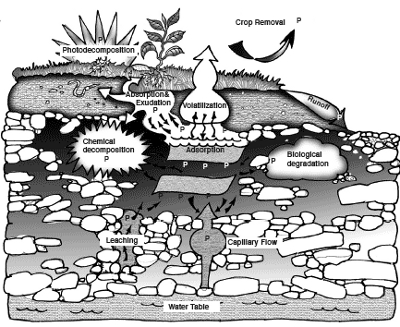
Why soils need to be remineralized
 Yesterday, I mentioned that Steve
Solomon's health improved when he spent six months in Fiji eating
nutrient-dense vegetables. The obvious question
is --- why isn't all soil as good as the stuff in Fiji?
Yesterday, I mentioned that Steve
Solomon's health improved when he spent six months in Fiji eating
nutrient-dense vegetables. The obvious question
is --- why isn't all soil as good as the stuff in Fiji?
When it comes to soil
minerals, you need to understand both rocks and rain. The bedrock
that slowly dissolved to make up the soil in your garden will determine
which minerals were there to begin with --- some rocks are more
well-rounded than others. But even if your rocks are perfect,
lots of rain can still wash those nutrients out of the earth through a
process known as leaching.
As with rocks, not every
area is equal in terms of leaching potential. Hot, dry areas like
the American southwest have little or no leaching because all of the
water that hits the ground is sucked up by plants and transpired back
into the air through their leaves, or simply evaporates from the
earth's surface. At the other extreme, New England soils are
strongly affected by leaching because cold weather keeps water in the
ground once it hits, so water tends to gush through the topsoil and
into the groundwater, carrying minerals away with it. In general,
most of the soils in the eastern United States have been depleted by
leaching unless careful stewardship has kept organic matter levels high
at all times. (Humus holds onto the same minerals that rain tries
to wash away, keeping them cycling even if soils are flushed with
water.)
 Another factor to consider is
age of your soil. Young soils have lots of minerals, but as soil
ages, the rocks dissolve and stop adding extra nutrients to the
soil. In addition, the cation
exchange capacity of
soils tend to degrade over geologic time. Here's where the
southeast is even worse off than New England --- we haven't had
glaciers down here recently to top off our rock reserves, so many soils
are old and low on minerals.
Another factor to consider is
age of your soil. Young soils have lots of minerals, but as soil
ages, the rocks dissolve and stop adding extra nutrients to the
soil. In addition, the cation
exchange capacity of
soils tend to degrade over geologic time. Here's where the
southeast is even worse off than New England --- we haven't had
glaciers down here recently to top off our rock reserves, so many soils
are old and low on minerals.
Assuming you aren't as
lucky as folks in Fiji, you'll need to remineralize your soil to get it
back in balance. This is why Solomon is down on the
compost-cures-all-ills approach to gardening. As he explained:
"Fertilizing a garden by composting local vegetation and animal manures
derived from that same kind of vegetation will only magnify the
regional soil imbalance." Time to get scientific and figure out
exactly what your unique soil really needs.
This
post is part of our The Intelligent
Gardener lunchtime series.
Read all of the entries:
|
Want more in-depth information? Browse through our books.
Or explore more posts by date or by subject.
About us: Anna Hess and Mark Hamilton spent over a decade living self-sufficiently in the mountains of Virginia before moving north to start over from scratch in the foothills of Ohio. They've experimented with permaculture, no-till gardening, trailersteading, home-based microbusinesses and much more, writing about their adventures in both blogs and books.
Want to be notified when new comments are posted on this page? Click on the RSS button after you add a comment to subscribe to the comment feed, or simply check the box beside "email replies to me" while writing your comment.
- Remove comment
- Remove comment
- Remove comment
